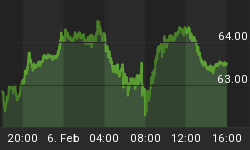Bond Rout in Pictures
German 10-year bonds hit a yield low of .048% on April 16. Since then it's been a pretty steep uphill climb in yield (down in price).
Germany 10-Year Bond Yield

Spain 10-Year Bond Yield

Yield on the Spanish 10-year bond hit a preposterously low yield of 1.052% on March 11. It now sits at 2.136%, a rise of 108 basis points.
US 10-Year Bond Yield

Get Used to Higher Volatility
Bloomberg reports Draghi Says Volatility Here to Stay as Global Bond Rout Deepens.
With an insouciant turn of phrase, Mario Draghi whipped up a frenzy of selling in government bonds that left German securities on track for their worst two-day slump in the history of the euro era.
After the ECB President said markets must get used to periods of higher volatility, Germany's 10-year borrowing costs jumped to a seven-month high, Treasuries tumbled and Spanish bonds pared gains. Government bonds in the euro region extended a drop from Tuesday, when a report showed euro-area inflation rose more than economists forecast. The declines left investors sitting on a year-to-date loss for the first time in 2015.
"We should get used to periods of higher volatility," Draghi said at a press briefing in Frankfurt on Wednesday. "At very low levels of interest rates, asset prices tend to show higher volatility. The Governing Council was unanimous in its assessment that we should look through these developments and maintain a steady monetary policy stance."
US Yield Curve
Curve Watchers Anonymous puts the bond rout in proper perspective with this chart.
Comments
- Yield on the US 2-year bond (purple) and 3-year bond (green) have been steadily rising since early 2013.
- Yield on the 30-year bond (red) and 10-year bond (orange) hit recent highs in late 2013 before declining for the entire year in 2014, bottoming in January of 2015.
- Yield on the 5-year bond (blue) rose sharply in early 2013 and had meandered near 1.6% ever since.
These actions are in line with what one would expect on the short end, presuming the Fed is going to hike. Yet, if the economy was really ready to lift off as the Fed thinks, yield on the long end would be rising faster than it has.
Will the Fed hike this year?
It's still data dependent. The Fed certainly has a rosier forecast for the economy than I do.
The wild card is the Fed may very well decide to hike anyway, having yapped about doing that for years.
















